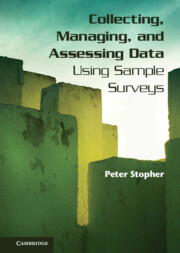Book contents
- Frontmatter
- Contents
- Figures
- Tables
- Acknowledgements
- 1 Introduction
- 2 Basic statistics and probability
- 3 Basic issues in surveys
- 4 Ethics of surveys of human populations
- 5 Designing a survey
- 6 Methods for conducting surveys of human populations
- 7 Focus groups
- 8 Design of survey instruments
- 9 Design of questions and question wording
- 10 Special issues for qualitative and preference surveys
- 11 Design of data collection procedures
- 12 Pilot surveys and pretests
- 13 Sample design and sampling
- 14 Repetitive surveys
- 15 Survey economics
- 16 Survey implementation
- 17 Web-based surveys
- 18 Coding and data entry
- 19 Data expansion and weighting
- 20 Nonresponse
- 21 Measuring data quality
- 22 Future directions in survey procedures
- 23 Documenting and archiving
- References
- Index
4 - Ethics of surveys of human populations
Published online by Cambridge University Press: 05 June 2012
- Frontmatter
- Contents
- Figures
- Tables
- Acknowledgements
- 1 Introduction
- 2 Basic statistics and probability
- 3 Basic issues in surveys
- 4 Ethics of surveys of human populations
- 5 Designing a survey
- 6 Methods for conducting surveys of human populations
- 7 Focus groups
- 8 Design of survey instruments
- 9 Design of questions and question wording
- 10 Special issues for qualitative and preference surveys
- 11 Design of data collection procedures
- 12 Pilot surveys and pretests
- 13 Sample design and sampling
- 14 Repetitive surveys
- 15 Survey economics
- 16 Survey implementation
- 17 Web-based surveys
- 18 Coding and data entry
- 19 Data expansion and weighting
- 20 Nonresponse
- 21 Measuring data quality
- 22 Future directions in survey procedures
- 23 Documenting and archiving
- References
- Index
Summary
Why ethics?
At any time that one is dealing with human populations, it is necessary to consider the ethics of what one may or may not ask members of the population to do. Increasingly, governments and universities alike are becoming extremely sensitive to issues of ethics, especially in relation to the privacy of individuals, and the burden that may be placed upon them by surveys. Several market and survey research organisations around the world have set up codes of practice, regulations, or ethical standards that they request or require their members to practise.
The dictionary defines ethics as relating to morals, or treating of morality or duty, or a set of moral principles. In the context of surveys of human populations, this clearly has to do with what it is morally correct to ask people to do, and how to treat those who are asked to participate in surveys. Perhaps one of the greatest threats to the ability of governments and agencies to undertake survey research that will ultimately benefit people is the unscrupulous and immoral use of surveys by entities that seek to profit from the use of such devices. It is, therefore, perhaps of even greater importance that those agencies engaging in survey research of an altruistic nature adhere to correct moral principles in all matters concerning interaction with the potential participants in a survey.
- Type
- Chapter
- Information
- Publisher: Cambridge University PressPrint publication year: 2012



